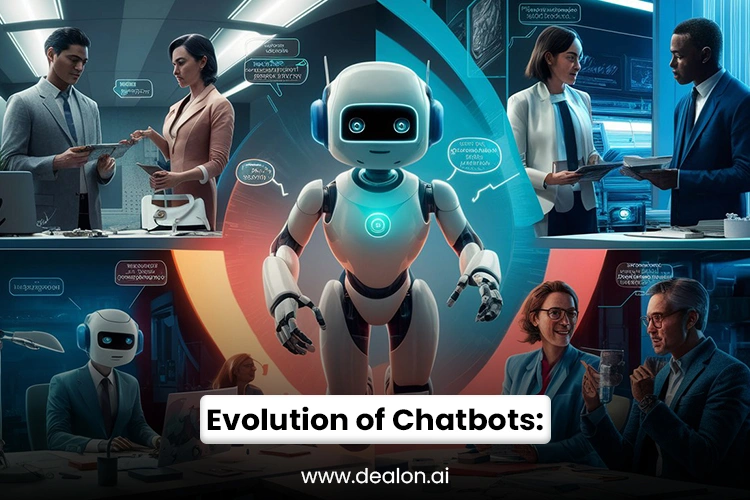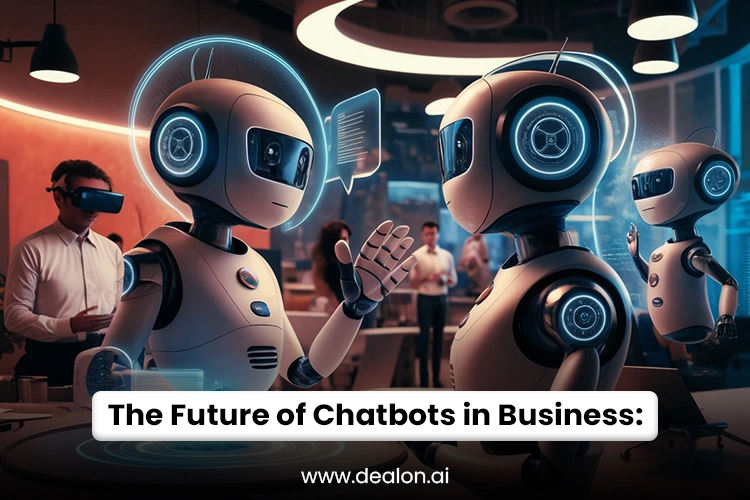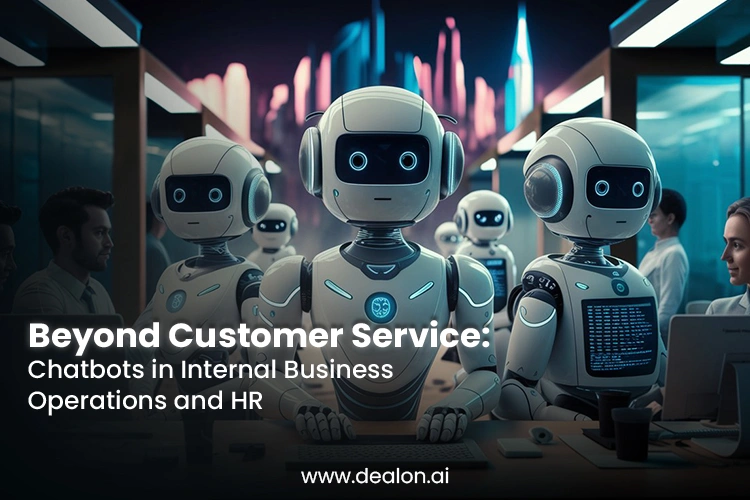Organizations seek innovative ways to enhance operational efficiency and optimize workflows in today’s hyper-connected, technology-driven business landscape. As automation tools gain prominence, one such advancement—chatbots—has risen to the forefront of transforming business operations. Historically associated with customer service, chatbots are evolving beyond their initial role, extending their reach into internal functions such as Human Resources (HR) and other core business processes. This technological leap is not merely about improving external communication; it’s about reimagining how businesses operate at their very core.
Integrating AI-powered chatbots into internal operations offers many benefits, from streamlining HR tasks such as recruitment, employee engagement, and policy management to automating routine administrative functions that consume valuable resources. These intelligent systems are reshaping how employees interact with company resources, offering real-time solutions and enhancing internal productivity.
Also Read: AI and Chatbots in Financial Services: Improving Client Experience and Accessibility
The Evolution of Chatbots: From Customer Service to Business Operations

Chatbots have come a long way since their inception as tools primarily designed to enhance customer service. Initially, these virtual assistants were deployed to respond to frequently asked questions, guide users through purchasing processes, and provide immediate support for common inquiries. Their ability to automate basic tasks helped companies reduce the burden on customer service teams, enabling them to focus on more complex issues. As a result, chatbots became invaluable assets for businesses striving to improve response times and customer satisfaction.
By integrating AI, modern chatbots can learn from user interactions, improving their responses. This adaptability allows them to handle a broader range of tasks, from managing Human Resources (HR) functions to overseeing payroll inquiries and facilitating administrative processes. For instance, HR departments can now rely on chatbots to automate time-consuming tasks such as candidate screening, employee onboarding, and answering routine questions related to benefits and policies. By performing these repetitive tasks, chatbots enable HR professionals to concentrate on more strategic functions, such as talent development and employee engagement.
Chatbots can address common employee queries related to compensation, deductions, and benefits in payroll management, providing instant and accurate responses. Rather than relying on HR staff to manually answer each inquiry, chatbots offer immediate assistance, significantly reducing response time and increasing employee satisfaction. This automation also reduces human error, ensuring that employees receive consistent and accurate information without the risk of oversight.
Moreover, chatbots are becoming integral in streamlining administrative workflows. These intelligent assistants can now handle routine tasks such as scheduling meetings, processing leave requests, and managing office supplies. In a dynamic corporate setting, offloading time-consuming tasks to chatbots allows teams to reclaim valuable time and focus on high-impact projects that fuel business growth.
As chatbots evolve, their integration into business operations will only deepen. Their role in both external customer service and internal functions demonstrates the growing versatility of AI-driven automation. These systems are not merely responding to inquiries but are actively enhancing the efficiency and effectiveness of business operations across the board. By automating routine tasks, reducing human error, and improving productivity, chatbots are transforming the very infrastructure of modern enterprises, paving the way for a more streamlined and intelligent approach to business management.
Enhancing HR Functions with AI-Powered Chatbots

HR departments manage talent, foster employee engagement, and ensure smooth organizational operations. However, these teams are often inundated with tasks ranging from recruitment to payroll management and conflict resolution. As companies grow and their operations become more intricate, HR teams can quickly become burdened by increasing administrative tasks. Enter AI-powered chatbots, which have evolved into a critical resource in optimizing HR functions and improving overall efficiency.
One of the most resource-intensive areas within HR is recruitment. Traditionally, HR professionals spend countless hours sifting through resumes, conducting initial candidate screenings, and answering repetitive queries from job applicants. With the introduction of AI-powered chatbots, this process has been transformed. Chatbots can now automate the initial screening of candidates by asking pre-set questions and analyzing responses. Through machine learning algorithms, these systems can evaluate resumes for specific skills, experiences, and qualifications, quickly narrowing down a pool of applicants to the most suitable candidates.
In addition to filtering candidates, chatbots can provide real-time answers to applicants’ questions regarding the application process, job descriptions, and company culture. By interacting with candidates instantaneously, chatbots can keep them engaged and reduce any frustration associated with waiting for responses. Furthermore, chatbots can autonomously schedule interviews, send reminders, and track the progress of the recruitment pipeline, streamlining the process and allowing HR teams to dedicate more time to high-value tasks, such as in-person interviews and decision-making.
HR departments are frequently tasked with addressing various employee inquiries, including questions about payroll, benefits, time-off policies, and more. This volume of queries can overwhelm larger organizations, leading to slower response times and increased employee dissatisfaction. AI-powered chatbots can alleviate this burden by providing employees with immediate, accurate responses. Whether an employee seeks clarification on vacation days, health benefits, or their pay stub, the chatbot can offer real-time answers, significantly reducing wait times and preventing HR staff from getting bogged down with repetitive tasks.
Chatbots allow HR personnel to focus their expertise on more nuanced issues, such as conflict resolution or employee development, by taking over routine inquiries. Furthermore, chatbots can be integrated with HR software systems, ensuring that employee data remains accurate and up-to-date while facilitating seamless interactions with various HR functions, such as payroll and benefits management.
AI-driven chatbots’ beauty lies in their ability to analyze data and provide actionable insights. By collecting employee feedback in real-time, chatbots can highlight trends, such as dissatisfaction with specific policies or processes, that may go unnoticed. This information allows HR teams to fine-tune their strategies, implementing targeted initiatives to address employee concerns and foster a positive work culture. Furthermore, chatbots can offer personalized recommendations for professional development, training, or internal job opportunities, contributing to an employee’s sense of value and growth.
Chatbots can also play a central role in preventing burnout for organizations looking to improve retention rates by automatically detecting signs of disengagement. For example, if an employee consistently reports dissatisfaction with their workload, the chatbot can flag this for HR intervention. This early detection system allows HR teams to take proactive measures before issues escalate, ultimately improving employee satisfaction and retention.
Optimizing Internal Business Operations with Chatbots
As businesses grow in size and complexity, optimizing internal operations becomes critical for maintaining efficiency and competitiveness. Traditionally, various departments have relied on manual processes to handle routine tasks, leading to inefficiencies and time wasted on administrative duties. However, integrating AI-powered chatbots into internal operations is transforming how businesses function. Chatbots are pivotal in streamlining workflows across departments and driving operational excellence by automating administrative tasks, improving internal communication, and fostering collaboration.
Administrative tasks, while essential, can become a significant drain on time and resources within any organization. From managing calendars and scheduling meetings to maintaining records and handling routine requests, these responsibilities are often time-consuming and repetitive. By automating these processes, chatbots enable businesses to operate more efficiently and free employees to focus on higher-value activities.
For example, chatbots can handle routine scheduling tasks such as arranging meetings, sending reminders, and booking conference rooms. They can autonomously manage leave requests and approval workflows, ensuring employees and managers stay on schedule without constant intervention. With the ability to instantly check calendars and avoid scheduling conflicts, chatbots help streamline the coordination of internal events, meetings, and deadlines, reducing the administrative burden on human staff.
Additionally, chatbots can assist with document management by helping employees access, organize, and maintain critical records. Instead of searching through files, employees can query the chatbot to locate specific documents, contracts, or reports. By automating these administrative processes, businesses can maintain a higher level of organization, reduce human error, and increase overall operational efficiency.
Chatbots can provide real-time updates on project statuses, departmental announcements, or urgent deadlines, keeping employees informed without overwhelming managers with constant communication requests. For instance, chatbots can push notifications about the completion of tasks, changes in project timelines, or new company policies, helping ensure that all team members are aligned and up-to-date on significant developments. This seamless flow of information reduces the need for frequent meetings and lengthy email chains, allowing teams to focus on executing their tasks rather than managing communication.
Furthermore, chatbots can assist in collaborative efforts by helping teams organize and track their work. They can facilitate sharing files, documents, and other resources within collaborative platforms, ensuring all team members can access the latest information. Whether a shared project management tool or a cloud-based document repository, chatbots can simplify collaborating on files, eliminating the need for multiple manual updates and ensuring the most up-to-date versions are always accessible.
Another key advantage of chatbots in internal operations is their ability to provide real-time data and insights, which can significantly enhance decision-making processes. By integrating with business intelligence systems, chatbots can present relevant metrics, performance indicators, or project updates to key stakeholders in a straightforward, digestible format. This permits managers to make better decisions based on up-to-date information without relying on lengthy reports or manual data analysis.
For example, a chatbot can pull data from project management tools, employee performance tracking systems, or sales dashboards and present key metrics in real-time. This transparency helps managers identify bottlenecks, track team progress, and allocate resources more effectively, optimizing workflow efficiency. With chatbots offering instant access to critical information, decision-makers can take swift action when necessary, preventing delays and ensuring projects stay on track.
Chatbots also improve employee productivity and satisfaction by automating routine administrative tasks and enhancing internal communication. When employees are relieved from time-consuming manual tasks, they can dedicate more time to high-impact activities that contribute directly to business goals. Furthermore, chatbots help create a more organized and efficient work environment, reducing stress and improving employee morale.
Chatbots can provide employees instant access to necessary company resources, such as training materials, policy documents, or IT support. By acting as a 24/7 virtual assistant, chatbots empower employees to find the information they need when they need it without waiting for assistance from HR or other departments. This autonomy boosts employee satisfaction and fosters a sense of self-sufficiency, leading to a more engaged workforce.
The Future of Chatbots in Business: A Strategic Asset

As the digital landscape evolves, so does chatbots’ role in modern business operations. Traditionally seen as tools for enhancing customer service, chatbots rapidly expand their footprint across internal operations, particularly in Human Resources (HR) and administrative functions. This paradigm shift positions chatbots as indispensable strategic assets, not merely as supplementary tools for customer interaction.
With businesses continuously striving for operational efficiency, adopting chatbots in internal processes promises to revolutionize workflows and decision-making. As organizations increasingly depend on AI-driven solutions to streamline tasks, chatbots will continue to provide significant advantages. Their integration into business operations yields cost savings, boosts employee satisfaction, and enhances productivity. The future, however, holds even more transformative potential as the capabilities of chatbots evolve.
We can expect chatbots to become even more intelligent, adaptive, and intuitive shortly. The continued advancement of AI and ML will allow chatbots to handle increasingly complex tasks. For example, while current chatbots can automate essential administrative functions, future iterations can analyze data, forecast trends, and even contribute to strategic planning. Leveraging advanced predictive analytics, these intelligent systems empower businesses to make faster, data-driven decisions—boosting agility and giving them a competitive edge.
Furthermore, chatbots’ ability to adapt to various business contexts will likely lead to their integration across multiple facets of an organization. They facilitate cross-departmental communication, support project management by optimizing resources, or even contribute to high-level decision-making by processing vast amounts of real-time data. This increased versatility will make chatbots essential in virtually every aspect of a business, whether operational management, employee engagement, or customer interaction.
The future role of chatbots will also extend to maintaining a human-centric approach to business operations. While AI can handle much of the administrative load, chatbots will continue to serve as bridges between human employees and the technology that empowers them. For instance, chatbots will augment human decision-making by providing real-time insights, assisting in task prioritization, and offering personalized recommendations based on data-driven algorithms. This will permit organizations to function more efficiently while maintaining the human touch that is critical for fostering positive employee experiences and customer relationships.
Conclusion
Chatbots have undeniably evolved beyond their traditional role in customer service, establishing themselves as powerful tools for internal business operations, particularly within Human Resources (HR) and administrative functions. Chatbots enhance efficiency, reduce human error, and allow employees to concentrate on high-value activities by automating repetitive tasks, streamlining communication, and offering real-time assistance. Chatbots are revolutionizing how businesses operate, from recruitment and onboarding to handling employee queries and optimizing internal collaboration. As AI and Natural Language Processing (NLP) continue to improve, chatbots will become more savvy, adaptive, and capable of handling complex tasks. Their support in decision-making, data analysis, and strategic planning makes them essential assets for organizations aiming to stay ahead of the competition.
By integrating chatbots across various business functions, companies can drive operational efficiency, improve employee satisfaction, and reduce costs.
The future of chatbots in business is bright, offering organizations a chance to blend technological innovation with human-centered approaches. Businesses that embrace chatbots as strategic tools, rather than just customer service aides, will pave the way for enhanced agility, improved employee engagement, and long-term growth in an increasingly digital world.

